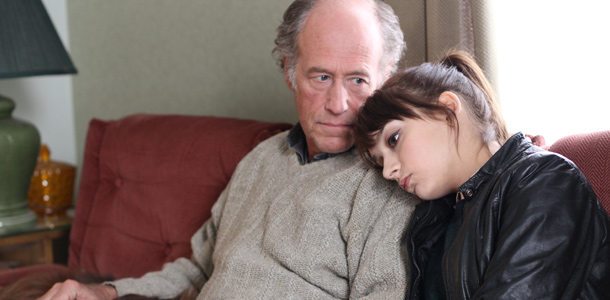Torino 31 screening - review - THE DISMANTLING by Sébastien Pilote
 Sébastien Pilote continues the trend of stories set in small farms examining quiet and introvert farmers in his new drama The Dismantling.
Sébastien Pilote continues the trend of stories set in small farms examining quiet and introvert farmers in his new drama The Dismantling.
After the quiet farmer steroid fuelled loose cannon in Roksam’s Bullhead and the quiet farmer experiencing a re-awakening of homosexual feelings in Leopold’s It’s All So Quiet, Pilote’s new drama The Dismantling tells the tale of a quiet farmer who also happens to be a loving and devoted father. So much so, in fact, that when one of his daughters rushes up to him asking him for a large sum of money to prevent her and her kids from losing their city house after a separation from her husband, he is willing to sell the farm. The same farm that was handed down to him from his father and that dictated his whole existence to the point of it having become an extension of his own self and his own personality.
Of the three films representing the small quiet farmer trend that is interestingly present on the film landscape today, this may be the most crowd pleasing or at least instantly accessible harrowing portrayal. It is a soft-spoken domestic drama, yet also a harrowing character study of a man whose life of sacrifice for the land has left him alienated from the outside world. This makes Gaby an almost mythical ‘man with no name’ figure, a cowboy of old time, as accentuated by the slow drone of the country guitar score – although also implied in the film is a connection with the Shakespearean play King Lear. It is only right to note Gabriel Arcand’s performance, who delineates his character’s melancholia and benevolent nature with his warm voice and his facial expressions that overflow with humanity.
Furthermore, his surroundings are gloriously shot and the camera captures the light in a beautiful way. Even the sheep, whether playing and running around in the fields or bleating loudly in the stables look almost angelic. Together, all this creates an idyllic and heavenly vision that is occasionally ended abruptly by the occasional scene of inevitable violence that even Gaby seems to disagree with. For instance, after a sheep is brutally slaughtered by a group of people and burnt at the stake, he shows some remorse for agreeing for it to happen in the first place. “It doesn’t pay”, he says, and the feeling is that he doesn’t mean it mainly as a reference to the monetary exchange.
 As well as these instances, is the fact that this film constantly feels like a frustratingly relentless descent into a man’s self-inflicted unhappiness. This in turn leads us to wonder whether what we are seeing is the act of unconditional love of a father for his daughters or a sign of defeat of a man of older and outdated principles in this technological age – the latter point strengthened by a profound hostility towards an unwanted computer being brought to his house.
As well as these instances, is the fact that this film constantly feels like a frustratingly relentless descent into a man’s self-inflicted unhappiness. This in turn leads us to wonder whether what we are seeing is the act of unconditional love of a father for his daughters or a sign of defeat of a man of older and outdated principles in this technological age – the latter point strengthened by a profound hostility towards an unwanted computer being brought to his house.
This core dilemma is quite troubling and the aforementioned descent culminated in an ending full of poetry and an unsettling contrasting joyful despondency, which fulfils the power of the intimate and sometimes even uncomfortable character study that is certainly worth the wait, even through its dead moments and a slow start.